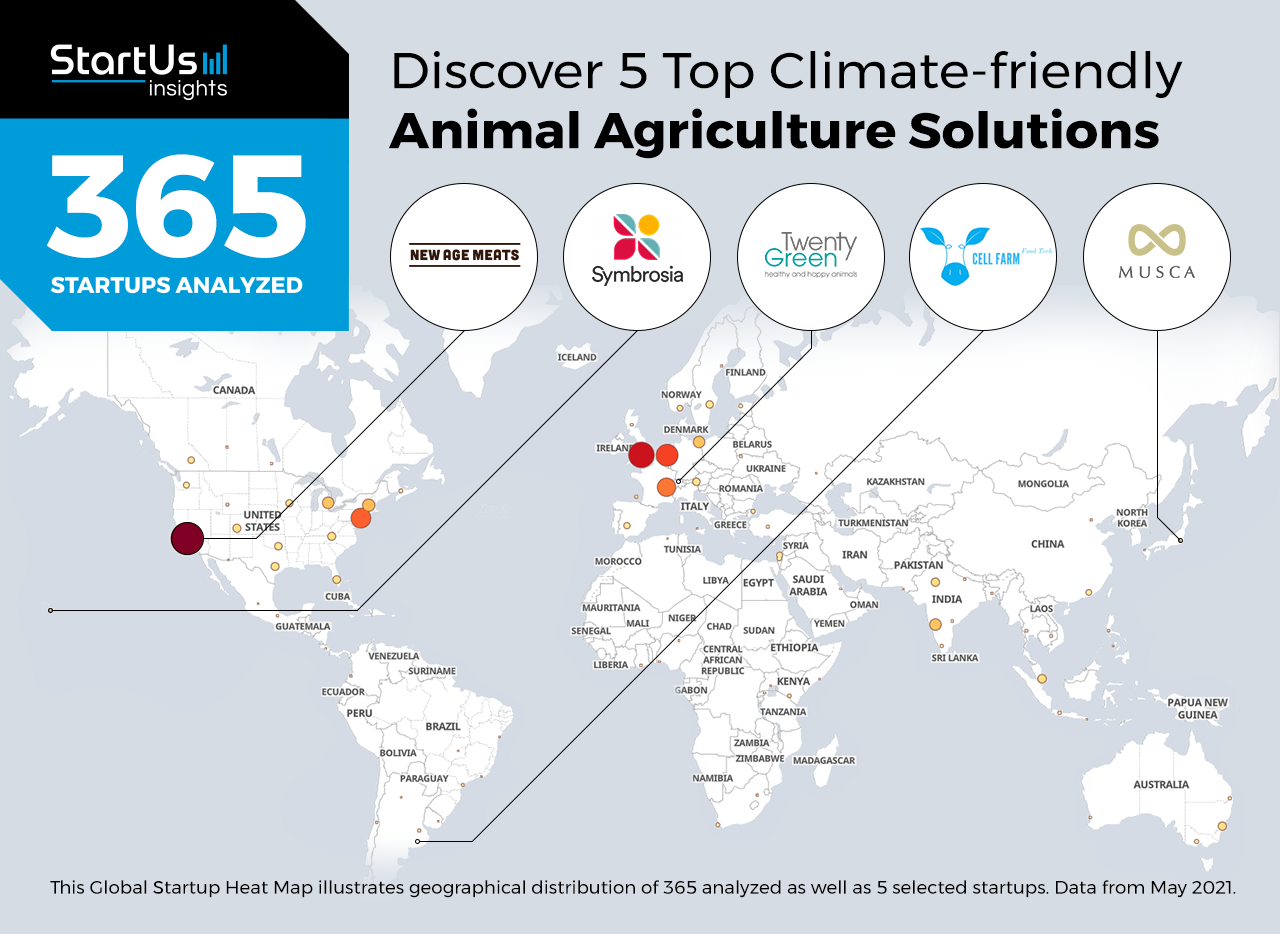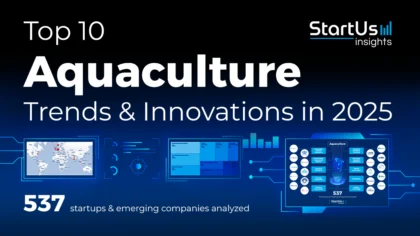Accelerate Productivity in 2025
Reignite Growth Despite the Global Slowdown
Staying ahead of the technology curve means strengthening your competitive advantage. That is why we give you data-driven innovation insights into the agriculture industry. This time, you get to discover 5 hand-picked climate-friendly animal agriculture solutions.
Global Startup Heat Map highlights 5 Top Climate-friendly Animal Agriculture Solutions out of 365
The insights of this data-driven analysis are derived from the Big Data & Artificial Intelligence-powered StartUs Insights Discovery Platform, covering 2.093.000+ startups & scaleups globally. The platform gives you an exhaustive overview of emerging technologies & relevant startups within a specific field in just a few clicks.
The Global Startup Heat Map below reveals the distribution of the 365 exemplary startups & scaleups we analyzed for this research. Further, it highlights 5 climate-friendly animal agriculture startups that we hand-picked based on criteria such as founding year, location, funding raised, and more. You get to explore the solutions of these 5 startups & scaleups in this report. For insights on the other 360 climate-friendly animal agriculture solutions, get in touch.
MUSCA recycles Livestock Biomass using Housefly Larvae
Current population growth rates demand an increasing supply of food. However, conventional agricultural and livestock farming practices contribute to deforestation, freshwater overconsumption, and greenhouse gas (GHG) emissions, accelerating food insecurity. This makes adopting sustainable animal husbandry for food production vital for preserving the environment while ensuring food supply. Therefore, startups develop solutions that optimize livestock farming by minimizing waste generation and improving water management.
Japanese startup MUSCA upcycles biomass wastes into organic fertilizers and natural protein feed for livestock and agriculture. The startup uses the hyper-speed lifecycle of housefly larvae to accelerate waste recycling. The recycled waste from agriculture and livestock is circulated back as high-value products, improving the sustainability of food production. MUSCA’s livestock waste recycling solution, importantly, allows farmers to reduce agricultural carbon emissions.
Cell Farm develops Cultured Meat using Biomimetic Design
Optimizing animal agriculture for minimal waste generation, water, and energy consumption improve the sustainability of livestock management. However, even with sustainable practices, the emissions due to enteric fermentation in livestock, and anaerobic fermentation of manure, are unavoidable. Therefore, startups develop effective animal agriculture methods, such as culturing meat alternatives based on livestock stem cells and plants. Advancements in biotechnology and synthetic biology enable startups to create artificial food with the same taste and nutritional value as that of agriculture-based food.
Argentine biotechnology startup Cell Farm uses biomimetic design to help companies develop cultured meat from animal stem cells. The startup deploys non-invasive micro biopsies on the animals to obtain the stem cells. Then, Cell Farm proliferates and differentiates stem cells into muscle and fat tissue, mimicking the natural processes in animals. In effect, this allows food producers to avoid cattle rearing while significantly reducing meat manufacturing costs.
TwentyGreen produces Probiotics for Animal Feed
Inefficient manure management and overconsumption of freshwater are critical factors contributing to climate change. Additionally, the input feedstock production for animal agriculture significantly warms the planet. A considerable part of agricultural produce is harvested to meet the needs of livestock. Therefore, with an increase in animal husbandry, farmers clear vast forest areas to expand animal feedstock production. This, in effect, promotes deforestation, further advancing climate change and damaging ecosystems. Startups develop sustainable alternatives and improve gut microbiome functionalities to optimize feedstock supply and consumption.
TwentyGreen is a Swiss startup that utilizes naturally occurring microorganisms to enhance the quality of gut microbiota in farm animals. The startup’s probiotics solution improves animals’ digestion and response to plant-based feedstock, as well as provides a better feed conversion ratio. This allows animal farmers to reduce feedstock volume and other health-related expenses.
Symbrosia reduces Methane Emission from Livestock Burps using Seaweed
Reducing methane emissions is an effective method to control the global rise in temperature. Livestock’s digestive processes cause cattle to burp, releasing methane into the atmosphere. Over time, cattle rearing has become a massive contributor to global methane emissions. To mitigate this, startups develop various solutions to control the methane production inside the cattles’ digestive system. For example, enhancing the cow diet with more digestible feed or adding more dietary fat to the diet reduces enteric methane emissions.
US-based startup Symbrosia reduces methane emissions from livestock burps. The startup uses the Asparagopsis taxiformis seaweed to block hydrogen from carbon during the digestion phase, reducing methanogens naturally. The startup’s seaweed is a sustainable feedstock produced using bioremediate waste from fish farms without requiring freshwater. Also, Symbrosia uses renewable energy to process the seaweed into animal feed. Spraying the startup’s seaweed into cattle feedstock improves the animals’ growth rate as well as reduces methane emissions. This enables animal farmers to save costs on feedstock and improve sustainability.
New Age Meats produces Cultured Meat with Plant-based Ingredients
Migrating to a meatless diet is one way to reduce the negative impact of animal husbandry on climate. To facilitate this transition and allow consumers to eat their favorite food without environmental concerns, startups develop meat and protein alternatives. These include artificial protein powders, 3D-printed meat, and insect-based nutrient supplements. Sustainable meat alternatives emit less carbon than conventional animal agriculture, allowing consumers, as well as food producers, to adopt a sustainable food culture.
New Age Meats is a US-based startup that produces cultured meat using animal cells and plant ingredients. The startup uses the texture and taste of plants to improve the quality of cultured meat. This way, the startup’s solution offers the sensory experience of original meat while being healthier and more sustainable. Moreover, the startup’s plant-based meat allows consumers to shift to environmentally-friendly food while still enjoying the flavors of real meat.
Discover more Sustainable Agriculture Solutions
Climate-friendly animal agriculture startups, such as the examples highlighted in this report, focus on reducing the impact of animal feed, biomass, and meat on the environment. While all of these technologies play a major role in mitigating climate change, they only represent the tip of the iceberg. To explore more agricultural technologies, simply get in touch to let us look into your areas of interest. For a more general overview, you can download our free AgriTech Innovation Report to save your time and improve strategic decision-making.








